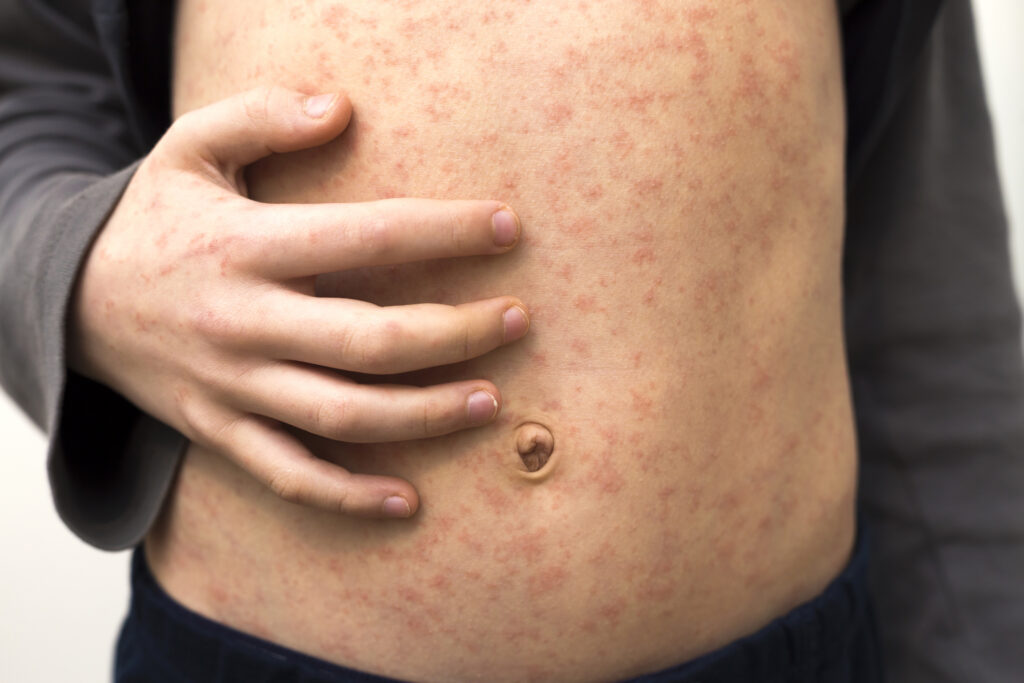MEASLES: HOW TO PROTECT OUR CHILDREN

Measles may seem like a disease of the past but as we know from current headlines, it is still a threat to our children. By ensuring that your child receives the MMR vaccine (measles, mumps, and rubella), you are not only protecting them from a dangerous disease but also contributing to the health and safety of your community.
What is measles?
Measles is a highly contagious viral infection that primarily affects children but can also impact adults. It spreads through the air when an infected person coughs or sneezes. The virus stays in the air for two hours.
Measles begins with flu-like symptoms, including fever, runny nose, cough, and red, watery eyes. Then a red rash will develop that typically starts on the face and spreads down the body.
While many children recover from measles without long-term problems, the disease can lead to serious complications such as pneumonia, brain swelling (encephalitis), and even death. Measles can also compromise a child’s immune system, leaving them vulnerable to other infections for years after recovery. One in five people are hospitalized.
Why is the MMR vaccine so important?
The MMR vaccine is incredibly effective in preventing measles. In fact, the MMR vaccine has been shown to be about 97% effective at preventing measles when children receive both doses as recommended. If ten unvaccinated people are exposed to measles, nine out of ten will contract it.
Vaccinating against measles not only protects your child but also helps protect the broader community. This is known as herd immunity. When a large percentage of the population is vaccinated, it makes it much harder for diseases like measles to spread. This is especially important for those who cannot be vaccinated due to medical reasons, such as infants who are too young or children with weakened immune systems.
Why are rates of measles infections rising?
In recent years, there has been a troubling rise in measles cases in the United States and around the world. This increase is largely due to a decline in vaccination rates, often fueled by misinformation and vaccine hesitancy. As more children remain unvaccinated, the risk of outbreaks increases, putting everyone at risk, especially vulnerable populations who cannot receive vaccines.
Are vaccines safe?
CPCMG understands that many parents have concerns about the safety of vaccines. However, extensive research has shown that vaccines, including the MMR vaccine, are safe and effective. The idea that vaccines cause autism has been thoroughly disproven. Countless studies have shown no link between vaccines and autism.
Vaccines, including the MMR vaccine, undergo rigorous testing and continuous monitoring to ensure they are safe for use in children. The benefits far outweigh any potential risks, which are typically mild and short-lived, such as a low-grade fever or mild rash. Another concern is the presence of heavy metals. The MMR vaccine contains no aluminum or thimerosal.
If my family is traveling to a high-risk area, can I get the MMR vaccine for my child early?
The normal schedule is first dose at twelve months of age but if your family is traveling to a high-risk area, the first dose can be given at six to twelve months of age. However, this early dose will not count as the first dose for the primary series of vaccines.
Protecting Future Generations
Thanks to vaccines, diseases like polio and smallpox have been nearly eradicated. However, to maintain this progress and prevent the resurgence of diseases like measles, we must continue to vaccinate our children.
If you haven’t yet vaccinated your child or are unsure about the MMR vaccine, we encourage you to speak with your CPCMG pediatrician. They can provide you with reliable, science-backed information to help you make an informed decision about your child’s health. We are here to support you in providing the best care for your child.

